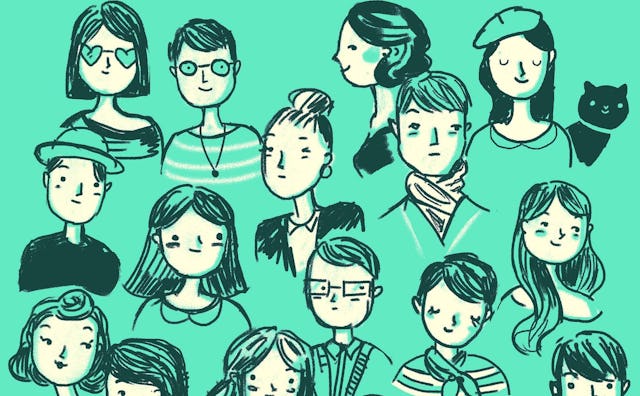Why We Think People Don't Like Us

A few months ago I met a woman in line for the bathroom at a café. I told her I liked her shoes and then, because it is very hard for me to talk for more than one minute without returning the subject to myself, we probably talked about my shoes. She laughed and smiled and was basically friendly and responsive. I believe we exchanged names, although I can’t be entirely sure. I thought perhaps we’d become friends.
After that, I would see her from time to time. Sometimes she said hi to me, and sometimes she didn’t, or at least that was the way I perceived things. So I only said hi to her sometimes, and other times I would pretend to look at the space above her head and see if she was about to say hi to me.
Then I started wondering if she was even the same person I had talked to, even though there are about 200 people in this town and no more than 26 of them look exactly like someone else. After a while I convinced myself that I had never actually met her; I stopped saying hi, and even stopped looking at the space above her head. And then eventually I told myself that she wasn’t nice, and that she didn’t like me.
Why are people so weird?
Isn’t it kind of amazing how we can justify being distant or unfriendly? We always tell ourselves that the other person started it. It’s not just with acquaintances either. People who have been close friends for years can fall into the same trap. I’ve been the middle man so many times between two people, each coming to me with the same complaint: “Well, I feel like I’ve tried a million times with her, and she never has any time for me, so if she wants to get together, she’s going to have to be the one to make the first move.”
It’s all very Jersey Shore-esque. But it’s not. It’s just people. There’s absolutely no use in trying to explain to someone in the throes of social self-pity that the slights are all in their imagination, that the other person is just busy, or preoccupied, or in fact thinks they themselves are the wronged party. In fact, the more you try to make someone feel better, the more they act like you’re trying to wrestle something precious away from them.
Returning – gratefully – to the subject of me, I must confess that even as I decided that this woman didn’t like me (and didn’t like me to the extent of ignoring me), I knew I was just playing out some kind of game. I was going through the motions of something that was familiar – something that, on some level, felt as good as it did bad. This was not such a surprise. Would we all spend so much time obsessing about the bad opinions of other people if we didn’t get something out of it?
Maybe it’s a way of feeling young and innocent and helpless again, the way we did when we were kids. (Do we secretly believe cultivating the sensation of having playground enemies will make us look younger?) Maybe we are just lazy and self-absorbed, and we don’t want to expend any effort getting to know people, so we just tell ourselves, well, they didn’t want to get to know us, anyway. Maybe – and this is less exciting – it’s just a way of making sure we’re right, because if we think no one likes us, eventually no one will. Actually, that’s not even true. A lot of people will probably still like you anyway. Sorry.
Why am I so weird?
Well, I didn’t get away with it, because this woman wrote me a note – on Facebook! Granted, I had written an article saying I didn’t have any friends, poor me, which I was kind of hoping people would not take seriously and then, at the same time, sort of hoping they would. Anyway, she did, or at least enough to write, “It would not have occurred to me that you were someone who would need friends.”
Now this made me sad, because I realized that I am very good at hiding my true self from people. But what’s weird is that I also felt kind of happy – for the exact same reason. Sure, it’s always a pleasure and a relief to connect with people after pushing them away, but is it equal to the thrill of knowing that you can protect yourself? Depending on what kind of childhood you had, it might not be.
But I’m an adult now. Everyone is way too worried about money, their kids, their relationship or their health to care about me one way or another. There’s no good reason to do anything other than assume everyone thinks I’m the greatest, is there?
Photo: Giovana Milanesi/flickr
This article was originally published on